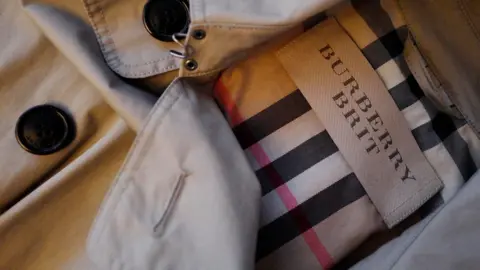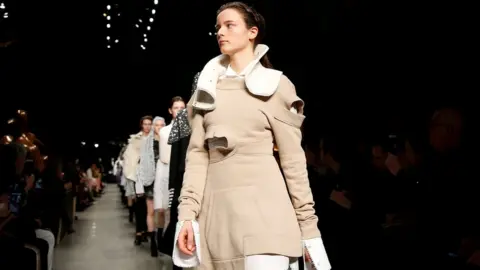Brexit: Burberry's Christopher Bailey sees 'enormous' trade potential
The potential for UK trade post-Brexit is "enormous", according to Christopher Bailey, the chief creative officer of British luxury brand Burberry.
But he told the BBC he hoped an anti-immigration climate would not endanger the UK's "thriving creative culture".
"Being able to share ideas, to collaborate with people from other cultures and countries, is fundamental to any creative business," he said.
Mr Bailey was chief executive of Burberry until July.
He returned to a more creative role, handing the chief executive reins to Marco Gobetti.
'Creatively nourishing'
Asked on the BBC's Today programme what the potential was for post-Brexit Britain, Mr Bailey said it was "enormous".
"I think it's a much smaller world today than it's ever been in terms of being able to trade," he said.
"The possibilities and the potential for growth, both locally here in the UK and overseas, is enormous," he added.
Drawing on Burberry's experience, he said that "Britishness resonates globally".
Burberry is considered by many to be the quintessential British brand, thanks to the resilient popularity of its check scarves and trench coats that shoppers abroad regard as a classic British look.
 Reuters
ReutersMr Bailey described London as "an energy hub for the creative industries" and said the UK boasted the best design and art schools, attracting people from around the world.
"We've got this creatively nourishing country that people want to feed off," he said.
When asked whether he thought the political climate towards immigration might pose a risk to that, he said he "desperately" hoped not.
Brexit effect
Mr Bailey has previously expressed concerns about Brexit, signing a letter before the EU referendum last year warning it could put the economy at risk.
His comments come a day after the chairman of the John Lewis Partnership, Sir Charlie Mayfield, said people "should be under no illusions" that Brexit is having some negative effects on the economy.
"Uncertainty is one of the consequences of this, and of course businesses never like uncertainty, because it makes it hard to plan for the future," he said.
The fall in the pound - which is still lower against the dollar and euro, despite gains this week - has also made imports more expensive for retailers like John Lewis.
Flying the flag
Burberry has benefited from the fall in sterling since the Brexit vote, with tourists, especially from China, taking the opportunity to shop more cheaply on visits to the UK.
The company also manufactures some of its products in the UK, providing another benefit from the weaker pound.
Currently the Far East accounts for nearly 40% of Burberry's sales. The firm does not publish a breakdown for individual countries.
 Reuters
ReutersCarla Busazi, an analyst with trend forecasters WGSN, said Burberry was in a strong position with its focus on exports and its clearly identifiable brand.
"I think it's good that a brand that flies the flag for Britain sees Brexit as a positive thing. I'm sure there are a lot of fashion brands who are very concerned about what that might mean for them.
"It's going to be something some British brands are going to struggle with and designer brands who predominantly sell in the UK are going to have challenges ahead."
Many British businesses are unclear what tariffs will be in place for trade between the UK and EU after Brexit.
Sir James Dyson, who backs Brexit, said on Thursday that he expected the UK to leave with no deal, and trade under World Trade Organization tariffs.
On Friday, Tim Martin, the chairman of pub chain JD Wetherspoon and a Leave campaigner, said it would be companies in the EU, not the UK, which would suffer from such an outcome.
However, former Bank of England governor Lord King has said he is "not impressed" with the UK's preparations for a failure in the talks, saying it is "very important" that the UK has a fall-back position.
Yorkshire on hold
Brexit, and changes in the industry combined with changing consumer behaviour, have created uncertainty for Burberry, Mr Bailey said, resulting in the suspension of a planned £50m investment in Leeds.
Burberry already has two manufacturing sites in Yorkshire, where its trench coats are made, but shortly following the Brexit vote last year the company said it was putting on hold the decision over whether to continue with the new development.
"Since we made that decision and bought that land a lot of things have changed in the world and as any responsible organisation, when you have these big shifts you need to reflect," said Mr Bailey.
"We are absolutely committed to keeping our manufacturing in this country with our factories in Yorkshire, but with the new site we're just taking a moment to make sure we understand the ramifications."
